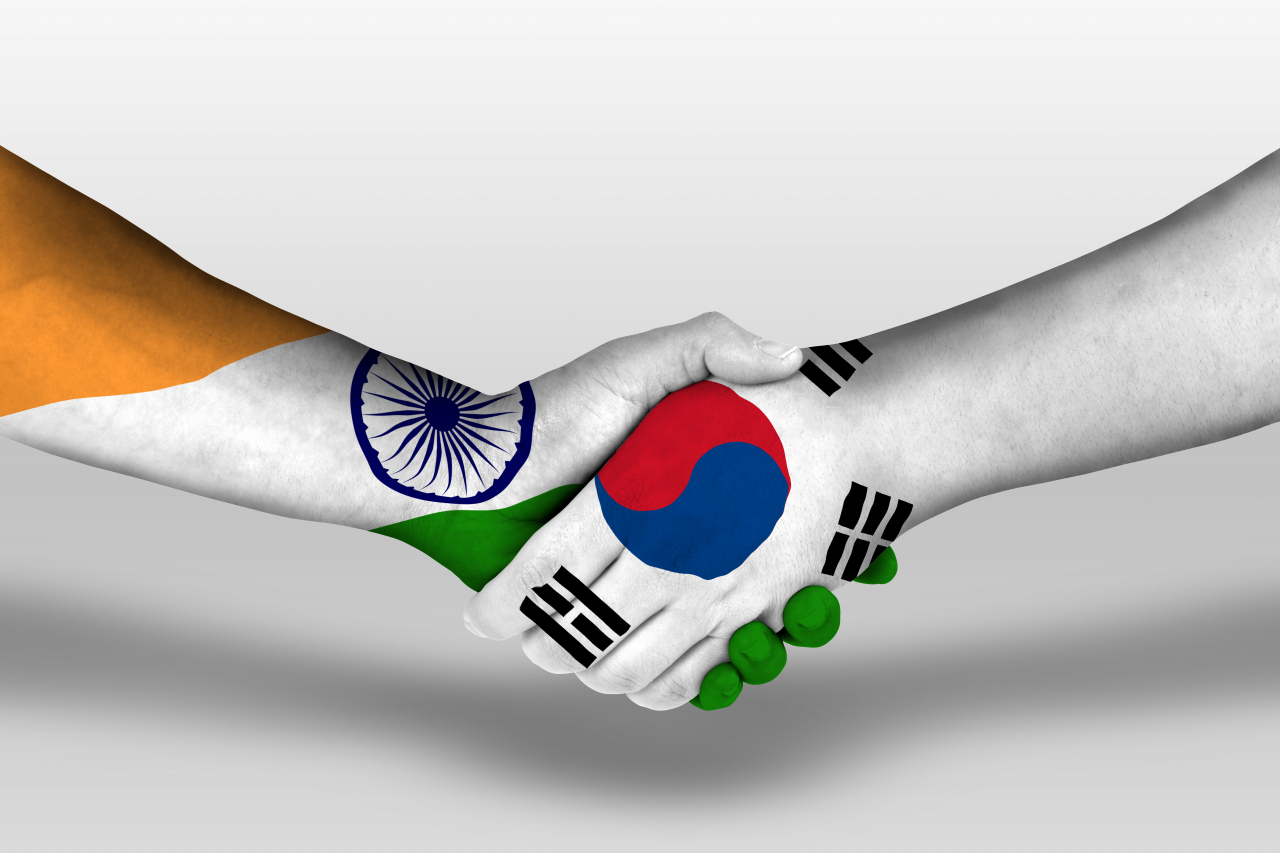 |
The national flags of India (left) and South Korea are embedded within images of shaking hands. (123rf) |
The synergistic cooperation between South Korea and India, deeply rooted in shared values, stands as indispensable in nurturing economic growth and security as well as regional security, amid compounding crises worldwide, South Korean Ambassador to India Chang Jae-bok said.
"The significance of India cannot be emphasized enough, given its status as the world's largest manufacturing hub and its potential as a market, as well as its role in ensuring economic security and sustaining global supply chains amidst geopolitical crises worldwide," Chang said in a written interview with The Korea Herald on Thursday.
"India is a partner which shares values including democracy, human rights and the rule of law."
Chang elaborated on India's unique status as the world's largest democracy and most populous country, while also highlighting its projected ascent to become the third-largest economy globally by 2027, propelled by a notable annual economic growth rate of 6 to 7 percent.
India is among the very few countries with which South Korea has forged a "special strategic partnership," alongside Indonesia, the United Arab Emirates and Uzbekistan.
Since establishing diplomatic ties in 1973, the relationship between Korea and India has undergone significant evolution. The emphasis on economic cooperation was particularly noteworthy, which gained momentum when Korean companies began operations in India in the early 1990s, according to Chang.
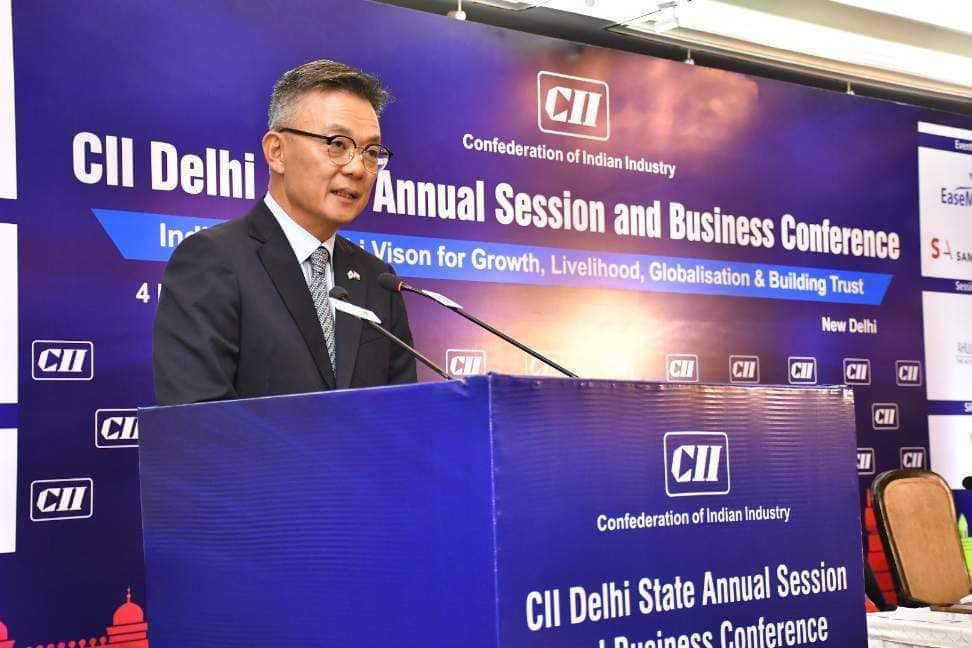 |
South Korean Ambassador to India Chang Jae-bok delivers congratulatory remarks at the CII Delhi's Annual Session and Business Conference, marking the release of the publication "India & Republic of Korea - Enduring Business Partnership at 50 and Beyond," on March 4. (South Korean Embassy in India) |
Given India's significant political and economic stature, South Korea's prominent manufacturing giants such as Samsung, LG and Hyundai, along with their partner companies, are bolstering their investments in the country.
"However, investments in sectors like electronics and automotive, once dominated by major corporations, have recently diversified into realms such as finance, IT, textiles and food," Chang noted, highlighting the significance of the trend. "This shift has led to a noticeable increase in the entry of small and medium-sized enterprises and startups, as well as the establishment of joint ventures."
The Korea Investment Corp. recently inaugurated an office in India. Additionally, Mirae Asset Financial Group has emerged as India's 9th largest asset management company and has further strengthened its presence by acquiring Sharekhan, the country's 10th-largest brokerage firm.
In the realm of entertainment, Krafton's Battlegrounds has gained prominence for its popularity as a mobile game across India, while in the culinary sphere, Korean pizza startup GoPizza has celebrated the opening of its 50th branch in the country.
"Considering both India's geopolitical significance and its value as a market, it is projected that the trend of India's growth and our companies' expansion into the Indian market will persist," Chang said.
"Our government intends to sustain its support for our companies in smoothly entering India by aligning with the policies of the Indian government."
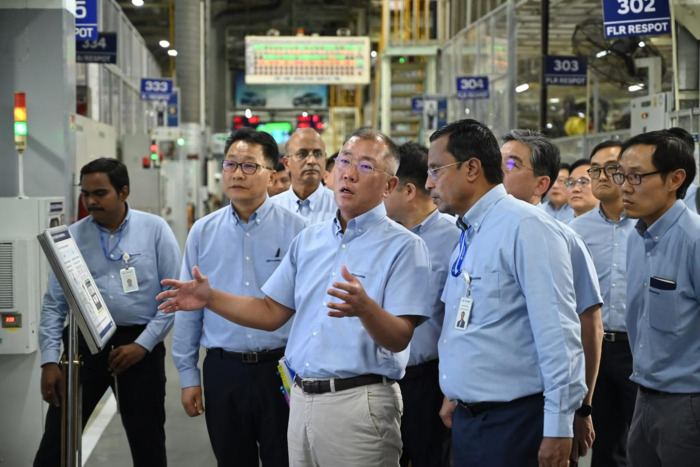 |
Hyundai Motor Group Chairman Chung Euisun (center) talks with Indian employees during his visit to Hyundai Motor India Research and Development Center in August last year. (Hyundai Motor Group) |
Since taking office in 2014, Prime Minister Narendra Modi has focused on manufacturing development and job creation through initiatives like "Make in India" and "Self-reliant India." The campaigns have attracted foreign investments such as South Korean outdoor apparel maker Youngone to expand their production facilities in India.
Unlike in many developing countries, in India, service sector growth preceded the development of light and heavy industries, evident in the rise of IT workforce outsourcing and English-speaking call centers.
"India's significance as a manufacturing hub for traditional light industries like textiles and footwear is expected to further elevate in the future," Chang said.
"The two countries possess complementary industrial structures, naturally positioning them as win-win cooperation partners. Moreover, the potential for cooperation in various technological fields including space, nuclear energy and biotechnology is boundless," he said.
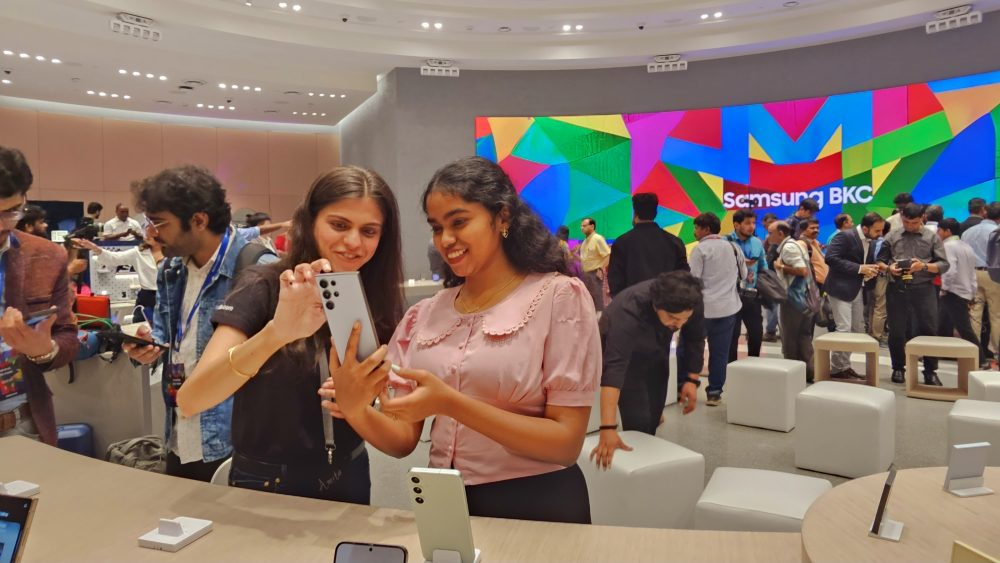 |
Samsung Electronics opened its flagship brand experience store, dubbed “Samsung BKC,” at Jio World Plaza Mall in Mumbai, India in January this year. (Samsung Electronics) |
Tech, innovation, supply chain
Chang underscored that recent economic discourse has centered around fostering stable supply chains, alongside cooperation in technology and innovation fields.
“Amidst the compounding global crises, securing stable supply chains through intergovernmental cooperation has evolved from a mere option to an imperative. To accomplish this, maintaining sustained cooperation with countries sharing values is imperative," Chang said.
"India holds significant economic value, but as the world's largest democracy, it shares values with our country. Our government aims to strengthen strategic communication and cooperation with India, our key partner in the Indo-Pacific region and a 'special strategic partner.'"
During the Joint Commission Meeting presided over by foreign ministers in Seoul in March, South Korea and India agreed to expand supply chain cooperation, particularly in new industries such as IT and electronics. Discussions are also underway for the establishment of the Korea-India Industrial Cooperation Committee
Additionally, in March, an inaugural trilateral technology dialogue aimed at expanding cooperation on critical and emerging technologies among Korea, India and the United States was held.
"The endeavors show the willingness of both countries to bolster cooperation in the realms of technology and innovation," Chang said.
Furthermore, with the planned establishment of Korea's full-fledged space agency named the Korea Aerospace Administration, in May this year, it is anticipated that cooperation with the Indian Space Research Organization will be further bolstered. This will complement the existing collaboration with the Korea Aerospace Research Institute.
South Korea and India have been cooperating in the semiconductor industry.
The US chipmaking giant, Micron, plans to build new assembly and test facilities in Gujarat, India. In support of Micron's semiconductor plant, Simmtech, a South Korean PCB manufacturer, intends to establish operations near the Micron plant.
South Korea's APACT, known for its expertise in semiconductor testing, has partnered with India's ASIP to establish an Outsourced Semiconductor Assembly and Test or OSAT facility, marking the first such cooperation between the two countries.
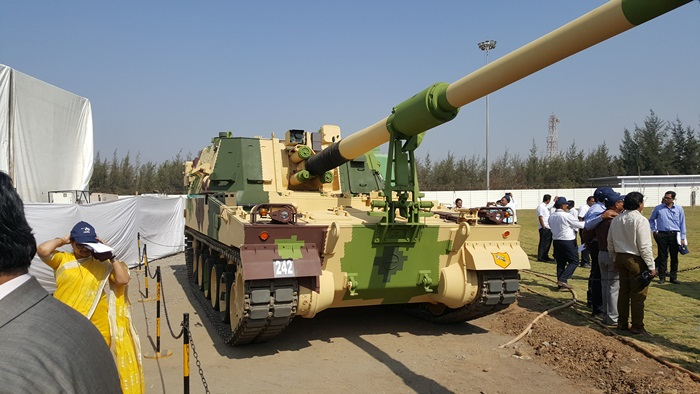 |
K9 Vajra (South Korean Embassy in India) |
Defense, security
The cooperation between Seoul and New Delhi transcends the realms of economics and technology.
Chang also pointed out that the "defense and defense industrial cooperation between South Korea and India has been steadily advancing, with its potential being notably high."
Following the mutual exchange of Army Chiefs of Staff in the latter half of last year, the chief of staff of the South Korean Air Force visited India in March this year. Plans are underway for a defense strategy dialogue in June, indicating enhanced high-level exchange and cooperation in the defense sector.
India has produced its own variant of the self-propelled howitzer, named the K9 Vajra, integrating technology transferred from the South Korean major defense contractor Hanwha Aerospace, based on its K9 Thunder platform. The second phase of manufacturing additional K9 Vajra units is currently underway.
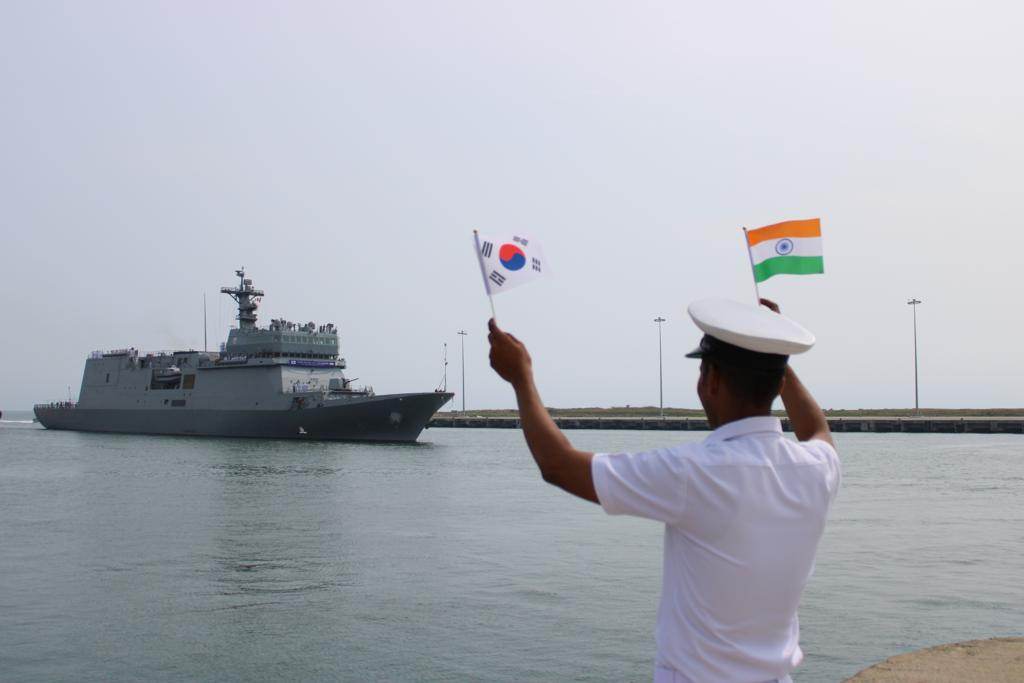 |
A South Korean Navy Cruise Training Task Group consisting of two naval ships, Hansando and Daecheong, arrived in Chennai, India, on a three-day visit in September 2022. (Indian Ministry of Defense) |
Ensuring robust maritime security cooperation is essential to safeguarding the interests of both countries.
South Korea heavily depends on trade, with exports and imports making up around 78 percent and 67 percent of its total, respectively. Much of this trade flows through key maritime routes, such as the Strait of Hormuz to the Indian Ocean and the Strait of Malacca to the South China Sea.
"As an open trading country pursuing peace, it is natural for Korea to bolster cooperation with India, a key player in the Indo-Pacific region. I believe that this cooperation is essential for the stability and prosperity of the region, transcending the development of the two countries," Chang said.
From the Indian side, since Prime Minister Narendra Modi took office in 2014, India's security strategy has notably shifted, with a newfound emphasis on maritime security embodied in the Act East policy. Modi's commitment to bolster India's global role, the imperative to strengthen naval capabilities amid China's rise, and the growing significance of cooperation with the international community are widely seen as contributing factors.
As a result, India's diplomatic and security priorities have shifted from Southeast Asia to East Asia and from the Indian Ocean to the Pacific.
"In this context, maritime security cooperation with South Korea, a pivotal country in the Pacific region, is viewed as a logical step forward," Chang said.
In maritime security, concrete steps to enhance cooperation include strengthening maritime exercises at various levels, sharing intelligence for maritime security, and intensifying efforts to foster mutual understanding and cooperation among partner countries, including the joint development of coastal resources.
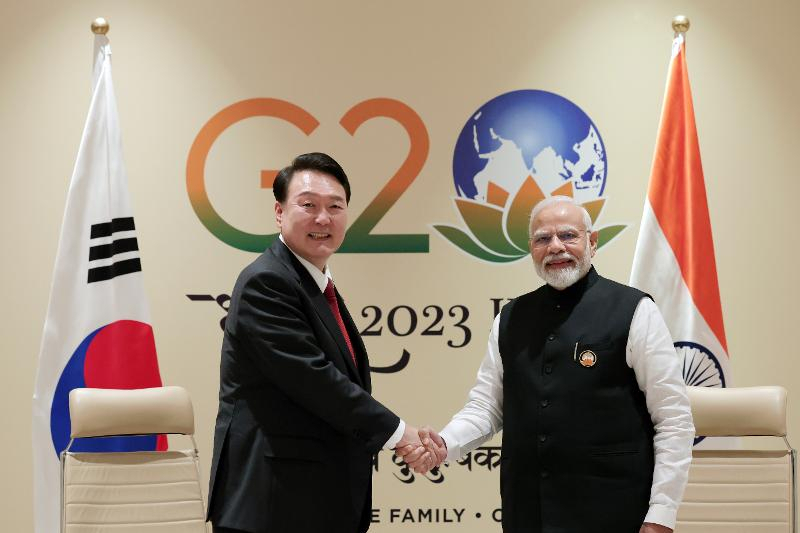 |
President Yoon Suk Yeol (left) shakes hands with Indian Prime Minister Narendra Modi at their bilateral summit, which was held on the sidelines of the Group of 20 Summit, at the International Exhibition-cum-Convention Centre, aka Bharat Mandapam, in New Delhi, India. (South Korean presidential office) |
Indo-Pacific and beyond
Chang also highlighted India's significance as a partner for South Korea in implementing the Indo-Pacific strategy and coordinating on the global stage.
South Korea and India also currently share similar positions in a multitude of international organizations and meetings, spanning from the UN Security Council, G20, Conference of the Parties, ASEAN Regional Forum and other ASEAN-related gatherings to the Asia Cooperation Dialogue and Minerals Security Partnership.
"Both countries are closely collaborating on a wide range of global challenges, including addressing climate change, fostering cooperation with the Global South, responding to pandemics and securing supply chains."
Furthermore, building on the foundation of active defense and defense industrial cooperation, Seoul and New Delhi can strengthen regional security cooperation in areas such as cyber security, maritime security and non-proliferation.
"Aligned with our government's Indo-Pacific strategy, there is a growing imperative to expand trilateral and quadrilateral cooperation, particularly with like-minded countries including India, amidst the escalating strategic competition between the US and China," Chang said.
With India, opportunities for trilateral cooperation arise in the fields of key emerging technologies and development cooperation, along with the US and Japan.
"Given India's significance as a complementary economic structure and a global supply hub, it serves as a highly important partner for cooperation even in the sphere of economic security," Chang said.
"We expect to contribute together to maintaining peace and stability in the region and the rules-based order, in harmony with our government's Indo-Pacific strategy and India's Vision for the Indo-Pacific."






![[Today’s K-pop] Blackpink’s Jennie, Lisa invited to Coachella as solo acts](http://res.heraldm.com/phpwas/restmb_idxmake.php?idx=644&simg=/content/image/2024/11/21/20241121050099_0.jpg)
